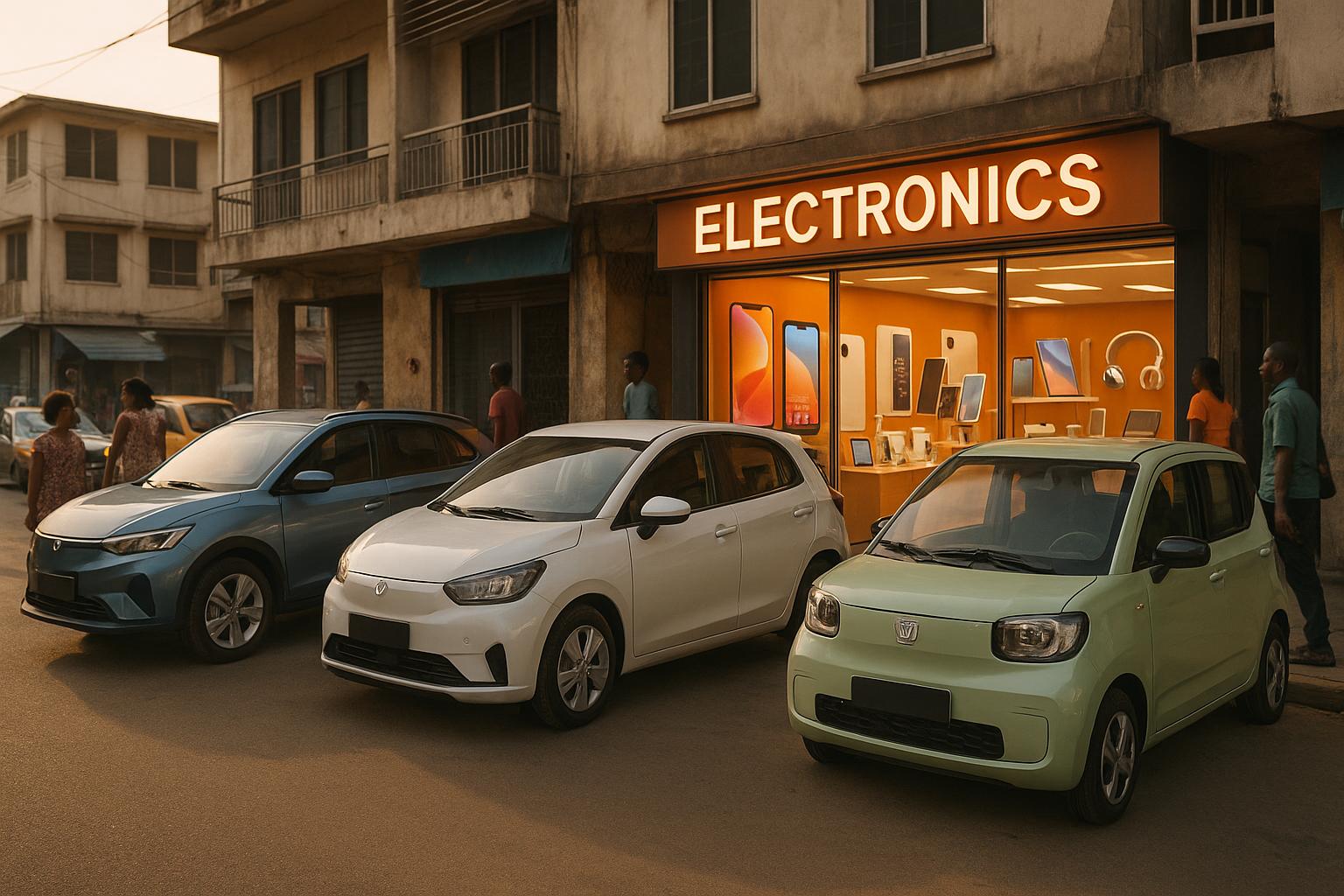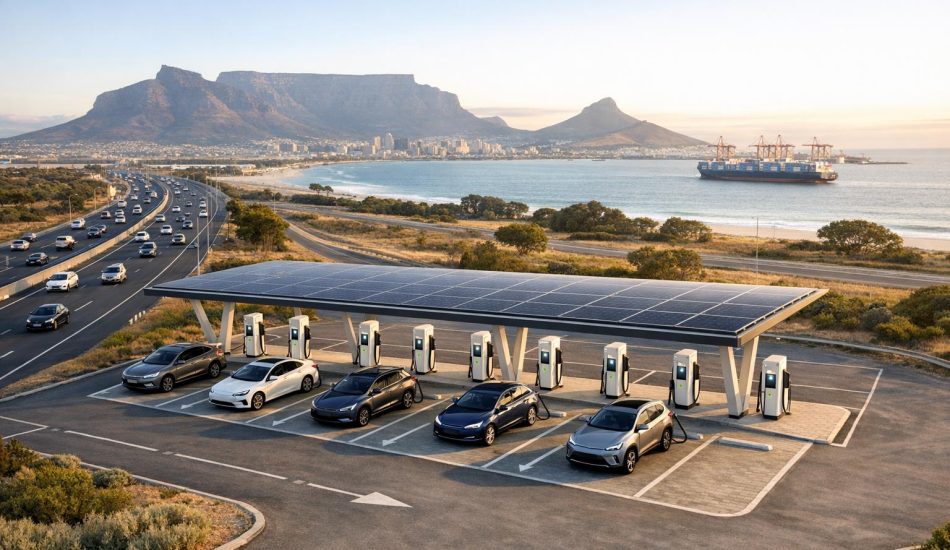
Chinese imports are reshaping Ghana’s tech landscape, especially in electric vehicles (EVs) and consumer electronics. While EVs face challenges like limited infrastructure and higher costs, their affordability through second-hand imports and local assembly is making them more accessible. Electronics, on the other hand, dominate Ghanaian households due to budget-friendly pricing and tailored features like long battery life and dual-SIM capabilities. Here’s a quick breakdown:
- EVs: 17,000 on Ghanaian roads by 2023, mostly two-wheelers. Key brands like BYD and Wuling are leveraging local assembly to reduce costs.
- Electronics: Chinese brands like Tecno, Infinix, and Itel collectively hold 40% of Ghana’s smartphone market, driven by affordability and practical features.
Challenges include inconsistent quality, limited service infrastructure, and Ghana’s need for more charging stations and repair networks. However, these imports are bridging gaps in affordability and modern technology access while supporting local assembly and job creation. Policymakers can strengthen this growth by improving infrastructure and enforcing quality standards.
Ghana Is Partnering With China To Establish Locally Manufactured Electric Cars
1. Chinese Electric Vehicles in Ghana
Chinese electric vehicles (EVs) have carved out a space in Ghana’s automotive industry, though their trajectory differs from the electronics sector. The numbers tell the story: between January 2017 and December 2021, Ghana imported about 17,660 plug-in EVs, with the majority coming from China. By the close of 2023, approximately 17,000 EVs were on Ghanaian roads, but only around 1,000 of these were four-wheeled vehicles.
Pricing Structures and Market Positioning
The pricing of Chinese EVs in Ghana reflects both opportunities and hurdles. For instance, a new electric sedan costs around $26,000, whereas a comparable internal combustion engine model is priced at $10,000. While this price gap may seem steep, Chinese manufacturers have employed strategies to make EVs more affordable.
One key approach is the reliance on second-hand imports and foreign resales, which helps bring down costs. Smaller, entry-level models from brands like Wuling and BYD are designed to fit middle-class budgets. A standout example is Wuling’s Hong Guang MINI EV, a compact vehicle with low electricity and maintenance costs, making it ideal for urban commuters.
Local assembly has also played a pivotal role in reducing prices. Take Solar Taxi, Ghana’s leading e-mobility company, as an example. By importing vehicle parts from China and India for assembly in Ghana, the company cuts transportation and tariff expenses while creating local jobs. From a pilot project in 2019, Solar Taxi has grown to become Ghana’s third-largest EV assembler in Africa as of March 2025.
"We are an e-mobility company. The taxi service is just one unit – we do much more", says Emmanuel Agyapong, Chief Operating Officer of Solar Taxi.
These pricing strategies have laid the groundwork for further market adaptation.
Local Market Adaptation
Chinese EV manufacturers have tailored their offerings to meet Ghana’s unique needs. Two-wheelers dominate the market, with over 400 Chinese e-bikes currently in use for delivery and courier services. Between 2017 and 2021, Ghana imported 9,431 motorized electric two- and three-wheelers, primarily from China.
The practicality of Chinese EVs has been a key factor in their success. Models like the Dongfeng Nammi 01 EV are well-suited for city commutes and taxi fleets, offering fleet operators a quick return on investment. Vehicles like the BYD e1 and BYD Seagull have also gained popularity in the second-hand market, thanks to their range and usability, which align with everyday needs in Ghana.
Local brands are also stepping up. Kantanka, a Ghanaian company, blends Chinese technology with local manufacturing to create vehicles that better handle Ghana’s road conditions and energy infrastructure.
Partnerships have proven effective in this space. For example, Kofa’s collaboration with China’s TAILG Group to supply Jidi motorcycles highlights how local firms are leveraging Chinese manufacturing expertise while staying close to local markets.
Technical Capabilities and Performance
Chinese EVs are designed with features that cater to Ghana’s specific needs. Compact designs, affordability, durability, and load capacity are some of the standout qualities. Models like the JAC iEV7S and iEV7L provide practical SUV options with ample space, making them appealing in both new and second-hand markets.
For commercial use, vehicles like Dongfeng’s Rich Pickup EV are ideal for tasks such as cargo transport and agriculture, where reliability and capacity are key. This focus on utility resonates with buyers in Ghana, who often prioritize functionality over luxury.
Newer entrants like VinFast are also making waves. By partnering with local businesses like the Jospong Group, VinFast is bringing a range of e-mobility solutions to Ghana, including electric two-wheelers and public transportation options.
An academic study conducted in 2024 found that driving range is the top priority for potential EV buyers in Ghana, even though only about 6% of respondents travel more than 31 miles daily. This highlights that "range anxiety" remains a psychological barrier, even when actual driving habits don’t justify it.
Environmental Impact and Sustainability
Chinese EVs are contributing to Ghana’s environmental goals. Companies like Solar Taxi are implementing solar-powered charging stations and repurposing old EV batteries for energy storage. The company has even expanded into neighboring countries like Nigeria, Togo, and Burkina Faso, showcasing the potential for growth in environmentally conscious business models.
The Ghanaian government has also stepped in to support this transition by offering tariff reductions and VAT exemptions for locally assembled EVs, particularly for public transport. The Ministry of Transport’s National Electric Vehicle Policy promotes adoption while emphasizing local assembly and workforce training.
However, infrastructure challenges remain. As of late 2023, Ghana had only seven public charging stations, all located in Accra. While the government has plans to establish 1,000 stations by 2028, this gap currently limits the potential of EVs, especially for long-distance travel.
"Africa has the opportunity to lead in this space. If we work together and trade among ourselves, we can create a thriving EV ecosystem that benefits everyone", says Emmanuel Agyapong of Solar Taxi.
Chinese EV technology is also aligning with local sustainability efforts. For instance, Solar Taxi uses local materials like plastics and steel in manufacturing, reducing the carbon footprint while supporting local industries. This approach integrates EVs into a broader circular economy.
Still, challenges like intermittent electricity supply outside major cities affect consumer confidence and the environmental benefits of EVs. To address these issues, Chinese manufacturers and local partners are working on innovative charging solutions and energy storage systems.
2. Chinese Electronics in Ghana
Just like their electric vehicle strategies, Chinese electronics manufacturers have found success in Ghana by blending affordability with designs that cater to local needs. These brands have made a noticeable impact on Ghana’s consumer market, with the electronics market projected to generate $162.35 million in revenue by 2025. Chinese brands have carved out a significant share of this market, thanks to competitive pricing, locally relevant features, and savvy marketing efforts. Their influence is especially visible in sectors like smartphones.
Market Dominance and Brand Performance
The smartphone market in Ghana provides a clear picture of the influence Chinese electronics have achieved. While Samsung leads the market with a 23.71% share, Chinese brands collectively dominate with a combined 40.08% share. Among them, Tecno claims 18.52%, Infinix holds 15.03%, and Itel accounts for 6.5%. Surveys reveal that half of Ghanaian smartphone users prefer Chinese brands, highlighting their popularity.
Pricing Strategies and Consumer Accessibility
Price is one of the most crucial factors for Ghanaian consumers, many of whom face financial constraints. With a minimum wage of just $2 per day and 45.6% of the population living in poverty, Chinese electronics brands have focused on offering budget-friendly options that align with local purchasing power. This strategy has made their products accessible to a broader audience.
Features Tailored for Local Needs
Chinese electronics manufacturers have gone beyond affordability, designing products that cater specifically to the needs of Ghanaian users. For example, 60% of users choose Chinese smartphones for their long-lasting battery life. Dual- and quad-SIM capabilities are another key selling point, addressing the need for flexible and cost-effective communication. Additionally, camera technology has been fine-tuned to perform well in varying lighting conditions, making these devices more appealing to African consumers.
Marketing and Distribution Strategies
Aggressive marketing campaigns and celebrity endorsements have significantly boosted the visibility of Chinese electronics in Ghana. These efforts, combined with well-established distribution networks, have helped these brands connect with consumers across the country. By leveraging these strategies, Chinese electronics manufacturers continue to strengthen their presence and influence in Ghana’s market.
sbb-itb-99e19e3
Advantages and Drawbacks
Chinese technology imports have reshaped Ghana’s automotive and electronics markets by delivering accessible, locally-tailored products. However, these imports also come with challenges that require attention. Let’s take a closer look at the benefits and limitations of these imports, along with a summary table for clarity.
Key Benefits of Chinese Tech Imports
Chinese electric vehicles (EVs) and electronics have gained traction in Ghana due to their affordable pricing and adaptation to local needs. Trusted brands like BYD and Chery have built strong reputations in the EV market, offering vehicles that meet consumer expectations. Similarly, Chinese electronics brands have carved out a niche by providing features that resonate with local users, such as extended battery life and cameras optimized for various lighting conditions.
Limitations and Concerns
While many Chinese brands deliver reliable products, quality inconsistencies can still be an issue. Some products may fall short in terms of durability, which can affect long-term consumer satisfaction.
Environmental concerns also arise. Although Chinese EVs are a greener alternative to traditional gas-powered vehicles, their manufacturing and recycling processes need refinement to fully realize their environmental potential in Ghana.
Another significant challenge is service infrastructure. Although Chinese brands are expanding their presence, aftersales support – such as repairs and spare parts – remains inconsistent, especially outside major cities. This limits accessibility for consumers in rural areas.
Here’s a breakdown of these factors:
| Factor | Chinese EVs | Chinese Electronics | Impact on Ghana’s Market |
|---|---|---|---|
| Pricing | Affordable compared to global alternatives | Budget-friendly and highly competitive | Makes modern technology accessible to more people |
| Market Fit | Well-received, supported by local assembly | Products tailored to local consumer needs | Broad appeal across different demographics |
| Environmental Impact | Cleaner than traditional vehicles, but production and recycling need work | Less significant environmental impact | Helps improve urban air quality |
| Quality Reliability | Reliable flagship brands, though quality varies | Quality depends on product range | Encourages consumers to make informed choices |
| Service Support | Growing service networks, but uneven outside cities | Better support in urban areas | Highlights the need for better aftersales infrastructure |
Local manufacturers, such as Kantanka, are stepping up to compete by offering products tailored specifically for Ghana, often at competitive prices due to reduced import costs. However, Chinese imports continue to dominate, thanks to their established supply chains and market strategies.
Despite some challenges, Chinese technology imports are bridging critical gaps in Ghana’s market. They deliver affordable, modern automotive and electronic solutions to consumers. As local manufacturing and service networks improve, these limitations are likely to diminish, paving the way for a more balanced market landscape.
Final Assessment
The influx of Chinese technology has reshaped Ghana’s automotive and electronics markets, bringing both opportunities and hurdles. It’s a dynamic where affordability meets the challenge of infrastructure limitations.
Take Chinese EV brands like BYD and Chery, for example. These companies have shown that electric vehicles can be both affordable and dependable in Ghana. Their success lies in aligning their offerings with local purchasing power. Yet, the lack of robust service infrastructure remains a major obstacle, especially in regions beyond Accra and Kumasi. Let’s explore how EVs and consumer electronics are carving distinct paths in Ghana.
Chinese electronics, on the other hand, have gained traction more easily, thanks to their lower dependency on infrastructure. Smartphones, tablets, and other consumer gadgets from Chinese brands are now household staples in both urban and rural Ghana. Their winning formula? Offering high-end features at budget-friendly prices, which makes advanced technology accessible to the country’s expanding middle class.
Guidance for Consumers
If you’re considering a Chinese EV, prioritize brands with established service centers and easy access to spare parts. For electronics, opt for manufacturers with a solid reputation in Ghana, especially those whose products are durable in tropical climates.
Also, make sure your purchase comes with comprehensive local warranty coverage. Manufacturer warranties that require international claims can be a hassle, so local support is key.
Recommendations for Policymakers
To support this growing market, Ghana’s government needs to focus on strengthening local service infrastructure. This will not only keep prices competitive but also ensure better consumer support.
Investing in technical training programs for EV maintenance and electronics repair could be a game-changer. These initiatives would create jobs and bolster the ecosystem around Chinese technology. Collaborating with Chinese manufacturers on skills development could accelerate this effort.
Additionally, a strong regulatory framework is essential. Clear quality standards should be enforced to protect consumers, but without creating unnecessary barriers for new technology. Certification requirements for imported goods can help strike this balance, ensuring that innovative products can still enter the market while maintaining consumer safety.
Chinese technology imports are proving to be a positive force for Ghana’s growth. They offer immediate access to cutting-edge automotive and electronic solutions, even as local infrastructure continues to develop. The challenge is to manage this transition carefully, so today’s gains evolve into long-term technological progress for Ghana’s economy.
For those navigating this fast-changing landscape, platforms like EV24.africa provide valuable resources. They offer insights into the electric vehicle market across Africa, including detailed specs and pricing for Chinese EV brands available in Ghana.
FAQs
Why are Chinese electric vehicles becoming more affordable in Ghana?
Chinese electric vehicles (EVs) are becoming more affordable in Ghana thanks to several cost-cutting strategies. A major factor is the importation of second-hand EVs, which come at a much lower price compared to brand-new ones. On top of that, the Ghanaian government has introduced tax incentives – like reduced tariffs or exemptions on EV imports, especially for public transportation – to encourage their use.
Local assembly efforts, such as those by companies like Solar Taxi, are also helping to bring down costs. These initiatives use locally sourced materials and take advantage of tax breaks, making EVs more budget-friendly for everyday consumers. Additionally, the government’s support for importing EV components has lowered production costs, further reducing the price of finished vehicles and making them more accessible to the Ghanaian market.
How have Chinese electronics companies gained a strong foothold in Ghana’s smartphone market?
Chinese electronics brands have carved out a substantial portion of Ghana’s smartphone market by zeroing in on three key factors: affordable pricing, early entry, and collaborations with local businesses. By delivering smartphones that combine advanced features with budget-friendly price tags, they’ve met the demands of price-sensitive consumers while keeping these devices within easy reach.
What’s more, these companies have teamed up with local distributors and retailers, building strong relationships and earning consumer trust. This smart mix of competitive pricing, early market presence, and strategic local partnerships has made Chinese smartphone brands a favorite choice for many Ghanaians.
What can Ghana do to build the infrastructure needed for the growing number of Chinese EVs in the country?
To accommodate the growing presence of Chinese electric vehicles (EVs) in Ghana, the government can take several practical steps to strengthen infrastructure and foster growth in the sector.
One major priority is expanding the network of EV charging stations across the country. The plan to install 1,000 charging stations by 2028 is a solid starting point and reflects a commitment to meeting increasing demand.
Another important move would be revising policies to introduce incentives. For example, offering tax breaks on EV components and creating green industrial zones could attract both local and international investors to the EV market. Training programs aimed at equipping local engineers and technicians with EV-related skills would also play a crucial role in transferring technology and building local expertise.
Finally, supporting local EV assembly plants through financial incentives and simplifying regulations could significantly boost domestic production. This approach not only strengthens the EV industry but also creates jobs, helping to drive economic growth alongside the sector’s expansion.




